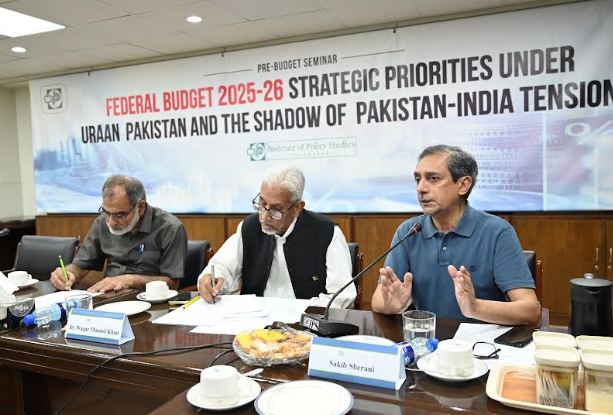DNA
ISLAMABAD, MAY 26: It is imperative that provisions of the upcoming Federal Budget 2025-26 align closely with the long-term objectives set out in the Uraan Pakistan five-year plan. The budget must reflect well-considered strategies that ensure inclusive and equitable economic development. Above all, political stability remains essential not only for sustainable economic growth but also for building investor confidence and striving for structural reforms.
Additionally, in light of tensions between Pakistan and India, it is equally critical that budgetary priorities incorporate related measures such as addressing water management challenges, particularly the Indus Waters Treaty issue.
These recommendations were put forward by economic policy and academic experts during a seminar, ‘Federal Budget 2025-26: Strategic Priorities under Uraan Pakistan and the Shadow of Pakistan-India Tensions’ at the Institute of Policy Studies (IPS), Islamabad. The speakers included Dr. Waqar Masood Khan, former federal secretary, Ministry of Finance, Sakib Sherani, former principal economic advisor to the Government of Pakistan, Zafar ul Hassan Almas, former joint chief economist, Ministry of Planning, Development & Special Initiatives, and Khalid Rahman, chairman, IPS.
The speakers noted that Pakistan is currently engaged in its fourteenth IMF program since 1988. While each arrangement has provided temporary economic stability, translating this short-term relief into sustainable, long-term growth is the fundamental challenge. They cautioned that without comprehensive structural reforms, the country will remain trapped in this recurring cycle.
The experts stressed that excessive focus on annual budgets undermines strategic economic planning. Crafting a budget without a 5- to 10-year vision fails to provide a coherent roadmap for development. In the current geopolitical context, particularly heightened tensions with India, the budget will likely be skewed toward immediate needs rather than long-term priorities.
While acknowledging recent improvements in the economic outlook, such as lower inflation, a stable balance of payments, a stronger currency, and a rebound in the stock market, the experts cautioned that these positive indicators stem largely from ad hoc measures rather than structural policy shifts. Key reforms, including pension system overhauls, must be comprehensive, inclusive, and institutionalized.
Speakers agreed that economic stability, rather than high growth, is the immediate priority. However, a 4–5% growth rate remains achievable and desirable, even within the constraints of the ongoing IMF program. To reach this goal, the government must significantly enhance export performance by offering targeted incentives and creating a more business-friendly regulatory environment.
The experts acknowledged Uraan Pakistan as a remarkable strategic initiative on paper but noted that it has yet to show meaningful implementation or visibility in government actions or on the ground. The upcoming budget offers a crucial opportunity to operationalize the plan’s vision. The experts concluded that positioning budgetary decisions with the strategic direction of Uraan Pakistan is essential to boost the export-to-GDP ratio, strengthen the IT sector, promote environmental sustainability and climate resilience, and support a transition to greener energy.
In concluding remarks, Khalid Rahman emphasized that the challenge facing the country is not merely economic but rooted in political economy issues and the lack of stability in policy formulation. He underscored the importance of policy continuity across successive governments to foster a stable and trustworthy business environment. He said recent improvements in economic indicators are commendable. However, short-term economic growth must be translated into long-term development to genuinely address the needs of the broader population. He also highlighted the vital role of the private social sector in contributing to the country’s economic and social well-being.

















